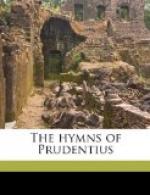We know little more of the life of Prudentius than he himself has disclosed. The Preface, which stands as an introduction to his poems, is a miniature autobiography of great interest. M. Boissier in his Fin du Paganisme calls it melancolique: though it is rather the retrospect of a serious and awakened, but not morbid, conscience. Prudentius views his past years in the light of that new spiritual truth to which he has opened his soul. We gather that he received a liberal education and was called to the bar. We need not misunderstand the allusion to the deceitfulness of the barrister life, seeing that the ordinary arts of rhetoric stand condemned by his recently adopted ethical standard. He held two important judicial posts and was promoted to a high position, probably in the civil service and not outside the limits of his native province, the provincia Tarraconensis.
He speaks of himself as having reached the age of fifty-seven, which brings us down to 405, and as intending to consecrate his remaining years to the poetic treatment of religious subjects. When and how he became a Christian we do not know, and it were vain to guess, although the suggestion that he may have owed his conversion to the influence of some Christian family of his acquaintance is at least interesting. It is unlikely that he took up poetry for the first time in his old age. His mastery of all kinds of metre—heroic and lyric—prove the practised hand. The probability is that in the years of repose after a busy career his desire to redeem an unspiritual past suggested for the exercise of his natural gifts a field hitherto unoccupied by any of the writers of his age. Why not consecrate his powers to the task of interesting the literary circles of the Empire in the evangel of Christ? Why not present the truths of Christianity in a poetic guise, wrought into forms of beauty and set forth in the classical metres of Roman literature? This became the passion of his life, and however we may view the results of his toil, the spirit in which he went to work, as described in the touching Epilogue, cannot but evoke our profound admiration. He is but a vessel of earth, but whatever the issue may be, it will be a lasting joy to have sounded forth the praise of Christ in song.
This then is how Prudentius becomes the first poet of the Christian Church, or, as Bentley called him, “the Virgil and Horace of the Christians.” Doubtless there were other influences at work to determine the sphere to which he was naturally attract. Ambrose, who was Bishop of Milan when Prudentius was twenty-six years of age, had written the first Latin hymns to be sung in church. Augustine in a familiar passage of the Confessions (ix. 7.) describes how “the custom arose of singing hymns and psalms, after the use of the Eastern provinces, to save the people from being utterly worn out by their long and sorrowful vigils.” “From that day




